Acne Treatment
Acne is a skin condition that affects up to 50 million Americans each year, according to the American Academy of Dermatology (AAD). Acne can range from being slightly bothersome to having a significant impact on a person’s well-being and self-esteem. Luckily, there are many ways to lessen acne’s effect on daily life.
Here’s what you need to know about acne, its causes, how it’s treated, and more.
What is acne?
Acne, also referred to as acne vulgaris, pimples, or zits, is a skin condition that results from the blockage of pores in the skin. When these pores become blocked by dead skin cells and an oily substance known as sebum, they can become inflamed, causing acne lesions.
Who does acne affect?
Acne is the most common skin condition, and it can affect people at all stages of life. It is most likely to begin in puberty and impact adolescents and young adults. According to the AAD, 85 percent of people will experience acne between 12 and 24.
Where does acne most commonly occur?
Acne is most likely to occur in the areas of the body where there are more oil glands, including the face, neck, back, chest, and shoulders, according to the ADD.
What are the different types of acne?
Acne lesions come in many different forms, depending on the stage of the blocked pore and the amount of inflammation involved. Different types of pimples can result from different inflammatory processes. The following is a description of the different kinds of acne, according to the Cleveland Clinic.
Blackheads
A blackhead is an open pore blocked by oil and dead skin cells. It often looks like a small black dot that won’t wipe off.
Whiteheads
A whitehead is a closed pore blocked by oil and dead skin cells. It looks like a raised white bump that may appear filled.
Papules
A papule is a small raised bump typically less than 10 millimeters in diameter. It does not appear to have a visible center but may look inflamed.
Pustules
When a papule becomes filled with pus, it is known as a pustule, often encircled by an inflamed red ring, and they can scar if picked or “popped.”
Fungal Acne
This type of acne results from a different mechanism than traditional acne vulgaris—it develops from excess yeast collecting in the skin pores, most often around hair follicles.
Nodules
A nodule is a larger papule (typically greater than 10 millimeters in diameter) not filled with pus. Nodules can extend deep into the skin and cause pain.
Cysts
When a nodule gets filled with pus, it becomes a cyst. These large, painful, pus-filled pimples can leave behind scars.
Symptoms and causes of acne
The Cleveland Clinic notes that acne can cause irritation, pain, itchiness, and psychosocial effects. Here’s what you need to know about the causes of acne.
What causes acne?
Hormones are partially responsible for the development of acne, which is why acne is so common during puberty, adolescence, and young adulthood, notes the Cleveland Clinic. People who have family members who developed acne are more likely to have acne themselves, so there may be a genetic basis for a person’s skin sensitivity to hormones. When hormone levels are high (such as around menstruation or in times of high stress), or when pores become blocked (because of headgear, air pollution, certain hygiene products, work environments, or digital manipulation), acne is more likely to flare up, reports the Cleveland Clinic.
Does chocolate cause acne?
The jury is out when it comes to the effect of chocolate consumption on acne. Some researchers have found that chocolate does not cause acne. However, according to research published in the Journal of the American Academy of Dermatology, some studies have linked chocolate consumption to more acne.
Why do so many teenagers get acne?
The hormones most implicated in acne outbreaks are known as androgens, which are present at high levels in teenagers, both male and female. This is why so many teenagers get acne, notes the AAD.
Do certain foods cause acne?
According to the AAD, some foods may be more likely to cause acne. These include cow’s milk (including skim milk) and processed foods high in sugar and, therefore, inflammatory.
Can acne cause scars?
Yes, acne can cause scars, especially the more severe forms of acne that cause nodules and cysts, notest the AAD. However, scarring can be reduced by avoiding picking or popping pimples.
Acne diagnosis and tests
To evaluate a skin condition that you believe may be acne, it’s vital to see a skincare doctor known as a dermatologist.
How is acne diagnosed?
Acne is typically diagnosed through a history and physical exam. A skilled healthcare provider can determine the nature of skin lesions simply by examining them, especially when they have collected more contextual information about when lesions occur and other related factors.
How severe can acne get?
According to the AAD, there is a wide range when it comes to the severity of acne. Mild acne is referred to as Grade 1, and it consists of blackheads, whiteheads, scant papules, and pustules. When a person develops more papules and pustules, they have Grade 2 acne, known as moderate or pustular acne. In Grade 3 acne, known as moderately severe or nodulocystic acne, a person may also have nodules and more involvement of their back and chest regions. In the most severe form of acne, Grade 4, people have numerous pustules and nodules.
Acne management and treatment
The ADD notes that having acne can take a great toll on your self-esteem because it can affect your physical appearance and also cause pain. However, acne treatment can help reduce the appearance and frequency of pimples.
How is acne treated?
Acne can be treated in many ways, including lifestyle changes, specific acne medications, and medications like birth control that can modify hormone levels, reports the AAD.
Do I need to see a specialist?
Often, mild acne can be managed by a primary care doctor, but moderate to severe acne should be managed by a dermatologist. Many people elect to see a skin care specialist so they can get a very specific treatment plan.
What should I do while waiting to see a dermatologist?
While waiting to see a dermatologist, it may be helpful to keep track of your acne flares to see if you can determine any regular patterns—for example, acne becoming worse during certain times of the month or after certain foods or exposures. Having this information can help guide your treatment plan, notes the AAD.
Acne prevention
While acne is largely determined by your hormones and genetics, there are certain things that you can do to help prevent flares or lessen their impact.
Can acne be prevented?
While some acne is unpreventable, there are skin care habits you can adopt to help reduce breakouts. The AAD recommends washing twice daily with lukewarm water and a gentle cleanser, using your fingertips instead of something more abrasive like a washcloth. Letting your skin heal naturally, and avoiding touching your face, can also help reduce pimples.
Acne outlook / prognosis
What can I expect if I’ve been diagnosed with acne?
Acne tends to improve when hormones stabilize. Seeing a dermatologist can help you get on a treatment path so that you can have the highest quality of life.
Are there any special concerns for women of childbearing age with acne?
Women of childbearing age should be aware that certain acne medications, including those available over the counter, can cause problems with a pregnancy, notes the AAD. Make sure to speak with a physician before using any acne medications—including body washes or cleansers with topical acne medication.
Living with acne
When should I see my healthcare provider about my acne?
Healthcare providers can help with acne at any stage, so don’t hesitate to seek professional help if the condition begins to cause you agony.
What questions should I ask my healthcare provider about acne?
Ask your healthcare provider about what you can do to improve your acne, including lifestyle changes. It’s also important to ask about what you can do if it doesn’t improve with your initial modifications.
Find Acne Treatment near you
- Alabama
- Alaska
- Arizona
- Arkansas
- California
- Colorado
- Connecticut
- Delaware
- Florida
- Georgia
- Hawaii
- Idaho
- Illinois
- Indiana
- Iowa
- Kansas
- Kentucky
- Louisiana
- Maine
- Maryland
- Massachusetts
- Michigan
- Minnesota
- Mississippi
- Missouri
- Montana
- Nebraska
- Nevada
- New Hampshire
- New Jersey
- New Mexico
- New York
- North Carolina
- North Dakota
- Ohio
- Oklahoma
- Oregon
- Pennsylvania
- Rhode Island
- South Carolina
- South Dakota
- Tennessee
- Texas
- Utah
- Vermont
- Virginia
- Washington
- Washington DC
- West Virginia
- Wisconsin
- Wyoming
Acne Treatment FAQs
What causes acne?
Acne is caused by hormonal fluctuations and certain environmental conditions—contrary to some skin care myths, it is usually not a reflection of poor skin hygiene or poor diet.
What is acne?
According to the AAD, acne is a skin condition caused by the blockage of pores in the skin by dead skin cells and a substance called sebum.
How to prevent acne?
Some acne can be prevented through a daily skin care routine. However, because it is usually caused by fluctuating hormones, not all acne can be prevented, reports the AAD.
What is a pimple?
A pimple is a raised lesion in the skin that is caused by a blocked skin pore. It can be open or closed, and it can range in size, reports the AAD.
What causes cheek acne?
Cheek acne is caused by fluctuating hormones, notes the AAD. It results from the blockage of skin pores that occurs from excess oil production.
Who can help fix my acne?
A skin doctor known as a dermatologist can help treat acne in addition to a general medical provider.
Where can I get acne treated?
Acne can be treated in a general practitioner’s office, a specialist’s office, or even through a convenient local care provider such as a walk-in clinic or urgent care. To find a “Dermatologist near me,” use Solv’s convenient service locator tool.
Solv has strict sourcing guidelines and relies on peer-reviewed studies, academic research institutions, and medical associations. We avoid using tertiary references.
Everyday Healthcare, Simplified
Expert advice to help you live your best life

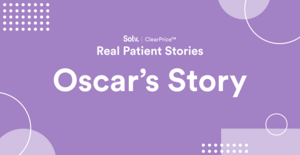
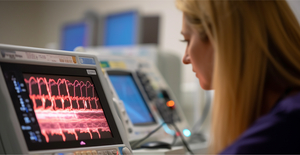
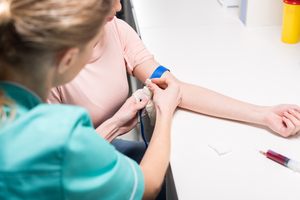
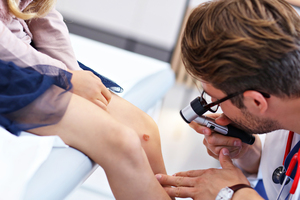


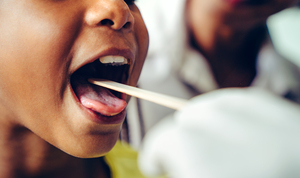
![In the Nurse's Office: Common Sicknesses in Schools [Infographic]](https://ucl-cdn-prod.thirdparty.solvhealth.com/dir/media/W1siZiIsIjIwMTMvMDgvMDkvMjJfMjVfMzZfMzU1X2NvbW1vbl9pbGxuZXNzZXNfaW5mb2dyYXBocGljLnBuZyJdLFsicCIsInRodW1iIiwiMzAweCJdXQ?sha=ca40956cd157189e)